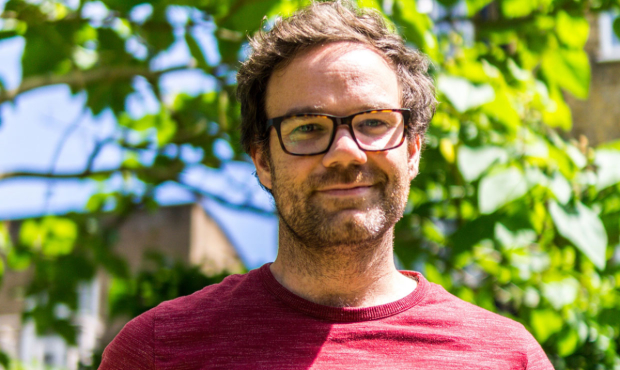Adam Spreadbury-Maher on Coming Clean at the King's Head and the theatre's Queer Season
The King’s Head AD on taking a look back at the ’80s with fresh eyes

Adam Spreadbury-Maher, artistic director of the King's Head, has chosen to headline the theatre's queer season with My Night with Reg writer Kevin Elyot‘s first play, Coming Clean.
Coming Clean was written while Elyot was in his thirties, before My Night With Reg, his breakthrough hit, made the theatre industry sit up and take note and it hasn’t received a staging since it opened at the Bush Theatre on 3 November 1982.
"After the My Night With Reg revival at the Donmar in 2014, it felt timely to do Coming Clean," says the Australian-Irish AD. "There’s a part of my remit that is looking at plays for the second time after the premiere" – he's previously breathed new life into the rarely staged The Sleepers Den by Peter Gill and Hannie Rayson's landmark Australian play Hotel Sorrento –"and now we can add Kevin Elyot to that list."
The show also matches up neatly with Twilight Song, Elyot's last play, which appeared at the Park Theatre in July. Coincidence? not exactly.
"I thought it was this wonderful gift to London, for audiences to be able to see his first and his last play."
It’s impossible not to question why, if Coming Clean is such a brilliant play, it hadn’t been revived before now, and the same thought went through Spreadbury-Maher’s head too.
"I thought 'am I missing something?' but one reason it hasn’t been revived is it wasn't read widely in educational institutions, it was a minority piece at the vanguard of theatre, then My Night with Reg happened and it’s only natural that when you have a play of that magnitude, you don’t look at what came before."
The play is set in 1982, 15 years after the The Sexual Offences Act 1967 which decriminalised homosexual acts in private between two men, both of whom had to be 21 years old and it’s also set before the HIV/AIDS crisis, although it does foreshadow it.

© Paul Nicholas Dyke
"Even though 1982 is not that long ago, it was a different time, it was the first few years of Margaret Thatcher's government and just before Section 28 was passed into law. It was a time when cottaging was still a thing and people lived without the internet. We are seeing a domestic picture where homosexuality is not demonised; Coming Clean is often referred to as the gay kitchen sink drama. There’s no laughing or pointing either. The characters go cruising and still have unprotected sex and [because of that] I don’t think it has been able to be revived until now. "
The production of Coming Clean also coincides closely with the timing of Angels in America starring Andrew Garfield at the National Theatre, which is also set in the early ‘80s and references an uninhibited gay scene.
"Now HIV isn’t a death sentence and people lead normal, healthy lives, it feels like a nice time to look at this period," says Spreadbury-Maher, who takes a lot of delight from the ‘80’s nostalgia of the show.
"We celebrate the deliciousness of the music of that time and we’ve done some really fun research into life in the '80s, the cast wear bits of '60s and '70s hand-me-downs as well, so it’s [got] a wonderful look [to it]."
"The actor playing Robert [Tom Lambert] announced he listens to Culture Club’s Do You Really Want to Hurt Me and we got it and and put it on a Walkman and he walked round outside with it to, in his words, 'look cool'."
The rest of the theatre’s queer season, which celebrates the anniversary of the Sexual Offences Act 1967 includes Outlaws to In Laws, a series of seven new plays from leading gay writers which are set in different decades from the ‘30s up to the present day. The Diary of a Nobody has been adapted for the stage and directed by Mary Franklin, and Swansong by Nathan Evans about a geriatric transgender man who attempts to overturn the heteronormativism of his care home.
"Artistic directors have a wider potential impact and responsibility to make the most of their position and add as much value in any way you can," says Spreadbury-Maher. "I’d much rather say at the end [of my directorship that] I did all I could."
He’s referring to putting on a queer season, but also more generally, Spreadbury-Maher has always aimed to have a positive impact on the industry. He’s a vehement supporter of fair pay and all his employees at the King's Head receive the London Living Wage. It is one of only a handful of small-scale unfunded theatres in the UK to have an Equity House Agreement, something which he has written about in the Guardian and elsewhere.
"The full-time office staff are on permanent or fixed contracts and for some box office staff who have several jobs it works for them to have zero hours contracts, but we move them on to a full-time contract after three or six months. It is better to be upfront and let them choose – and I think it’s better for society in general for people to have security of employment especially for actors."
The King's Head claims to be the first pub theatre since Shakespeare’s time – founded in 1970 – and Spreadbury-Maher is the second artistic director after Dan Crawford, who died in 2005. His CV is packed with success stories of small theatre made successful under his guidance. He founded The Cock in Kilburn, which ran from 2009 to 2011 ("It was a wonderful little theatre", he says). The Cock won the Peter Brook Empty Space award for best pub theatre and he founded OperaUpClose which won an Olivier Award during his tenure there. Then he went on to The Hope Theatre and was running both The Hope and the King's Head simultaneously for a while before turning his attention exclusively to the King's Head.
"We have satellite shows where we go to Dublin, Brighton and Edinburgh and we’re able to curate an annual festival, Festival 47, which runs in July. We’ve got a fantastic programme, despite our ickle size."
Coming Clean runs from 25 July to 26 August at the King's Head Theatre.












